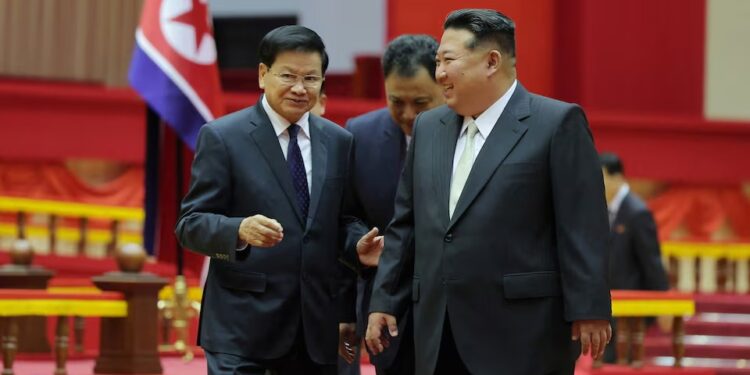North Korean leader Kim Jong Un held talks with Laotian President Thongloun Sisoulith in Pyongyang on Tuesday, state media KCNA reported, in one of the rare high-level diplomatic engagements by the isolated regime. The visit was marked by a formal welcome ceremony, complete with a 21-gun salute, and concluded with discussions aiming to “strengthen mutual cooperation” and a banquet hosted for the Laotian delegation. Reuters
Symbolism and protocol in a closed state
Thongloun’s presence in the capital comes ahead of the October 10 celebrations marking the founding of North Korea’s ruling Workers’ Party, with foreign dignitaries also expected to attend. Reuters+1 The rare visit by a foreign head of state is notable amid tight sanctions on North Korea and strict entry restrictions for outsiders. Reuters+1 The warm state reception—complete with top officials, crowds, and military honours—underscores the regime’s intent to project legitimacy and diplomatic relevance. Reuters
Diplomatic goals and regional context
The discussions, according to KCNA, centred on bolstering bilateral ties and partnership initiatives, though no detailed agreements were made public. Reuters Analysts suggest North Korea aims to reinforce its international alliances, particularly among fellow socialist states, as geopolitical isolation deepens. Thongloun’s visit aligns with other scheduled foreign visits, including those by China’s Premier Li Qiang and Vietnam’s Communist Party chief To Lam in the coming days. Reuters+1
Rising diplomatic visibility comes amid a broader push by Pyongyang to diversify its foreign relationships beyond its traditional backers. In recent months, Kim has emphasised military cooperation, strategic partnerships and geopolitical alignment with nations such as Russia and China. Reuters+2Reuters+2
Challenges and limitations apparent
While such high-profile meetings offer symbolic value, they carry limits under the regime’s opaque diplomacy. There is little clarity on the substance of the cooperation proposed, the scale of economic or military aid to be exchanged, or how sustainable any pledged cooperation might be, given resource constraints and strict international scrutiny. North Korea’s ability to deliver on commitments is often constrained by sanctions, economic difficulties and internal governance priorities.
Moreover, the regime may use the optics and media coverage of such summits for internal propaganda, reinforcing Kim’s stature domestically and internationally. Observers will watch closely what follow-up steps emerge—be it formal agreements, joint statements or expanded exchanges—and how they compare with past diplomatic overtures that seldom translated into substantive change.
Outlook and strategic implications
Kim’s hosting of Thongloun signals North Korea’s intention to keep diplomatic channels open, especially with ideologically aligned nations. As regional powers converge in Pyongyang for the upcoming anniversary celebrations, the Laotian visit may lay the groundwork for renewed cooperation or even regional balancing tactics. However, without clear commitments or transparency, much of the visit’s impact will depend on whether it yields tangible policies or remains largely ceremonial.
Newshub Editorial in Asia – 8 October 2025




Recent Comments